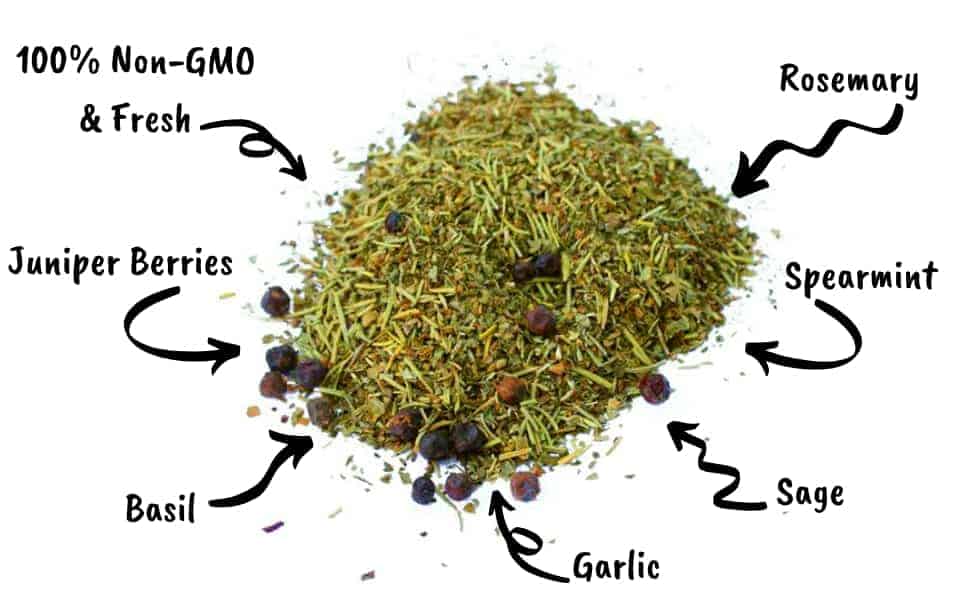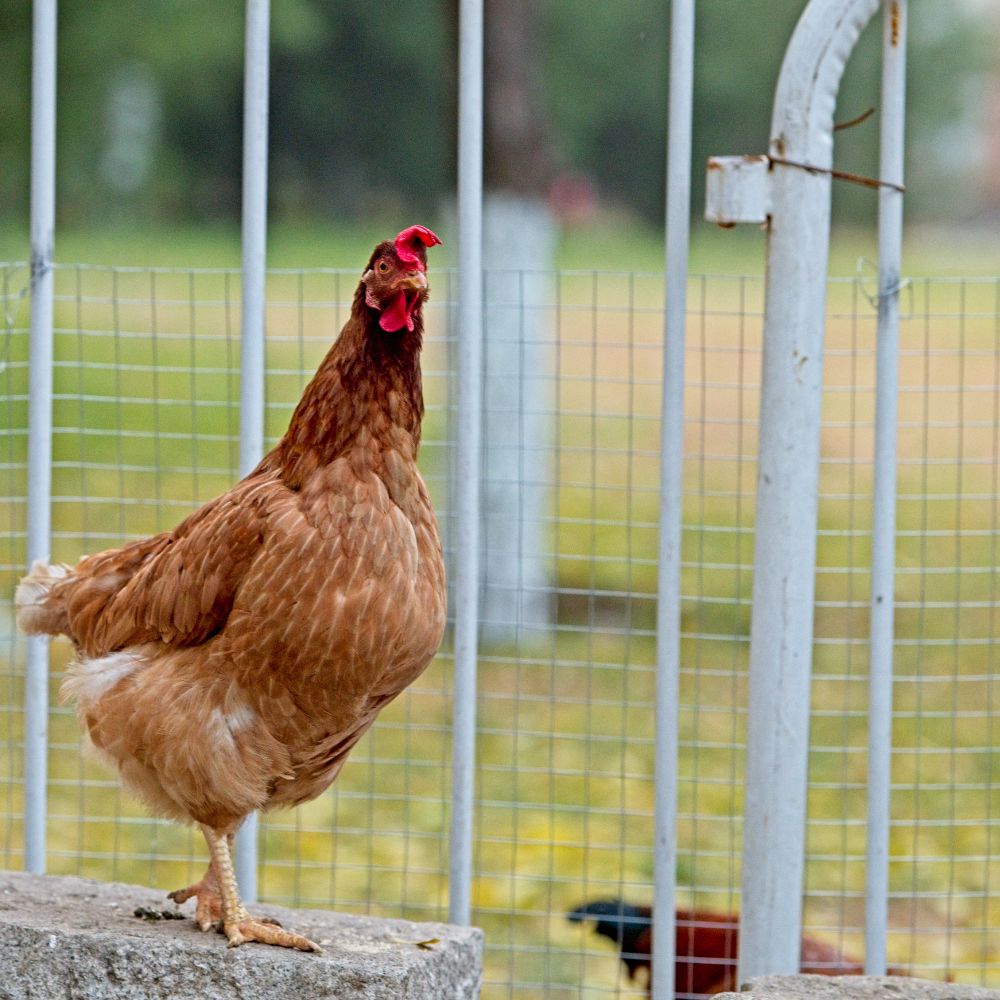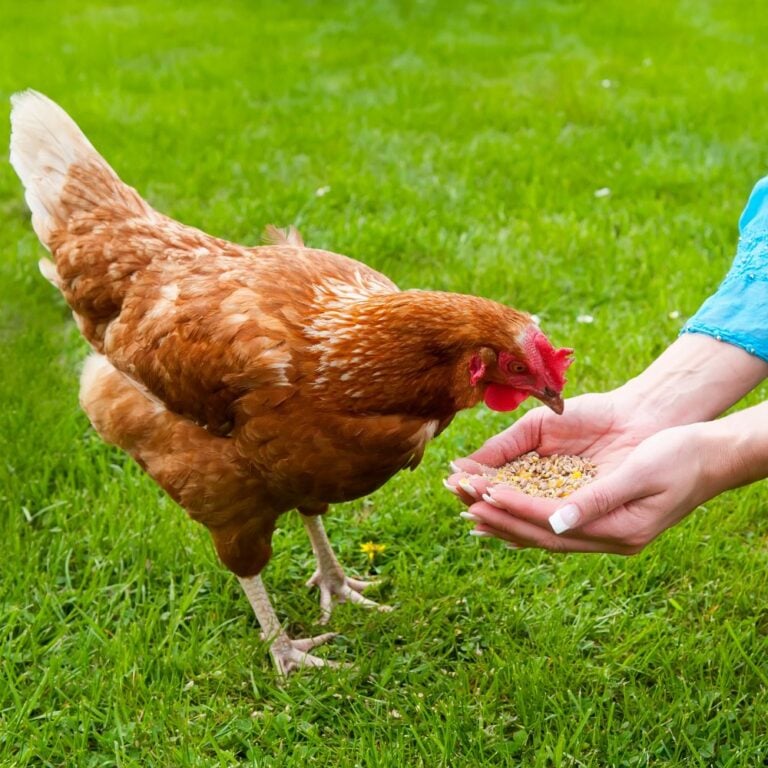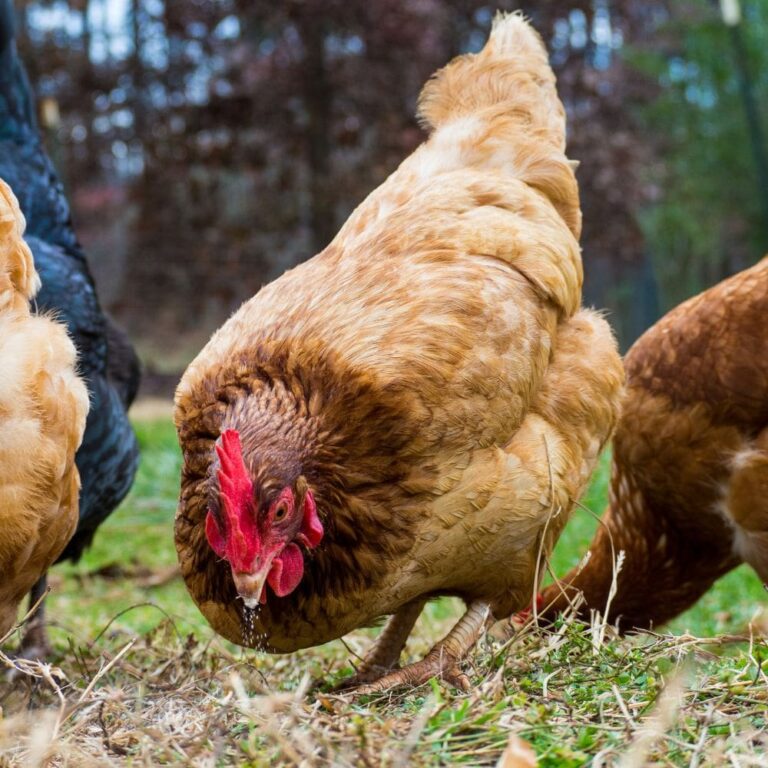One of the questions I get asked the most is: “Can I keep urban chickens even though I live in the city?” And my answer is always a huge YES!
Raising chickens is a rewarding and meaningful experience and I highly recommend it to everyone! There are, however, some things that you need to keep in mind when you are raising urban chickens in the big city.
It’s totally possible, but you will need to make some adjustments for an urban coop in order to keep your chickens happy and healthy.
Here are some of my favorite tips and tricks for raising urban chickens in small spaces.
My top tips for raising urban chickens are:
- Make sure you can have chickens in your area
- Feed organic herbs for healthier hens
- Feed your chickens a balanced diet with calcium and protein
- Use calendula
- Practice good coop hygiene
- Provide environmental enrichment
- Predator-proof your coop
Details about these tips AND even more tips are below, so keep reading!

Table of Contents (Quickly Jump To Information)
Make Sure You Can Keep Chickens In Your Area
Before we get started with the urban chicken-keeping tips in this article, first and foremost you need to make sure you can keep chickens in your area. Not every town allows them – PLEASE do your homework first!
Your town might allow chickens, but have limits on the number of chickens, how many feet they need to be kept away from other homes, or whether you can keep roosters or not. Certain neighborhoods have their own covenants and restrictions as well. So even if your city allows chickens, your neighborhood association may prohibit it.
It’s no good trying to keep chickens if your area doesn’t allow them – you’re doing your chickens a disservice because you might have to re-home them. Not fun for anyone!
Now, if you CAN keep chickens and you know all the city ordinances and local regulations, then read the rest of the tips in this article to help your flock be healthier and happier!
Use Organic Herbs in Feed & Nesting Boxes
For people keeping chickens in smaller spaces, such as urban backyards, my favorite piece of advice is to keep them happy and healthy with organic herbs.
Because an urban chicken coop tends to be smaller and owners need to protect their flock from predators, such as dogs and cats, urban chickens run the risk of developing negative behaviors such as feather picking because they don’t have as much space to roam in tight confinement.
So my recommendation is to provide them with herbs such as spearmint, rosemary, basil, sage, garlic, wormwood, and calendula.
That may sound overwhelming at first, but don’t worry – we offer special blends such as these that provide both a natural health boost and environmental interest because hens can pick at the herbs and explore their treat.

Feed Urban Chickens a High Quality Diet
Especially for urban chickens, it’s important that you make sure they have a well-balanced diet. They can’t free-range and forage for nutrients, and they lead slightly more stressful lives because urban chickens are typically cooped up all the time, or face environmental stress such as polluted air, lots of noise, etc.
One important nutrient to ensure the health of your chickens is calcium. Making sure your hens have access to high-quality calcium supplements is important to ensure they lay eggs with strong eggshells.
You can offer a calcium supplement in the form of oyster shells or dried, crushed eggshells. To dry your egg shells, simply wash them so the albumen is cleaned off, then allow them to air dry a bit.
Next, toast them by placing them in your oven at 200 degrees for about 10 minutes. Then crush, and offer separately or mix with your flock’s feed.
It’s also important to make sure that your urban chickens are getting enough protein. If you want an out-of-the-box treat, black soldier fly larvae are full of protein, fat, AND 50 times more calcium than treats such as mealworms.
And hens LOVE them! I have an in-depth article about the benefits of black soldier fly larvae here if you want more information!
Mix Calendula With Your Urban Chickens Feed
For golden yolks in your fresh eggs (which is why most people keep chickens – for healthier eggs), adding the herb calendula to your chickens’ diet is a must. We carry Best Eggs Ever! which has a healthy amount of calendula in it! Just put this blend in your hen’s nest box, and watch out!
Calendula contains beta carotenes, which lend their orange color to your hen’s yolks.
Practice Good Coop Hygiene
All-natural hygiene is a must for urban chickens. They are more susceptible to internal parasites such as worms and external parasites such as mites because they’re not able to move around as much as their country cousins.
Using essential oils such as melaleuca and lemon when cleaning their coop will help keep their home clean and hygienic. You can also use our Cleanest Coop Ever! Coop Refresher, find it here.
It’s important to not use household cleaners such as bleach – the fumes can harm your chickens, and when bleach mixes with the ammonia from your flock’s droppings, it can produce mustard gas! Yikes!
So, all-natural cleaners are a must to keep your flock healthy.
Provide Environmental Enrichment
Urban chickens can have more stressful lives due to different environmental circumstances than their pasture-raised counterparts.
So in order to avoid negative habits such as feather picking, you need to provide your chickens with some environmental enrichment activities.
This could be things like providing herbs for them to pick at or ensuring that there are places for your chickens to perch in your coop.
Providing environmental activities for your chickens helps to keep them happy and helps keep them from developing bad habits.

Predator Proof Your Coop
I’ve seen way too many urban chicken owners get burned because they didn’t predator-proof their coop. They thought there weren’t chicken predators in the city.
While you might not have to worry about chicken predators like raccoons or possums in the city, you do need to worry about cats, dogs, and any other animals that might be “interested” in your chickens. Always make sure that your coop is predator-proof so you can keep your chickens safe.
Dogs can be big problem for those raising chickens in the city. If you have a pet dog they can be just a little bit too interested in your chickens and that can cause huge problems.
My number one tip is to keep your chickens and dogs separate. Even the best-behaved dogs might get curious and ANY dog has the potential to seriously injure your chickens (even little dogs), so I recommend that you just keep them apart if you think there’s a chance your dog might play too rough with your chickens.
Make Sure Neighbors Are On Board
Many of the readers I get messages from are concerned about their neighbors getting upset because they have chickens. Honestly, as long as you don’t have a rooster, it is very unlikely that anyone will know you have chickens at all!
In fact, I know someone who was raising chickens in the middle of a neighborhood for years and his neighbors didn’t even realize they were there! Hens can be very quiet!
I keep my coop super clean so it doesn’t smell as bad, and hens aren’t typically noisy. In fact, I think dogs are 10 times more annoying for neighbors than chickens could ever be!
Most chickens are docile, quiet, and pretty well-behaved from my experience. And trust me – the second your neighbors try some of your chickens’ delicious eggs they won’t complain. In fact, they’ll probably want to get chickens of their own!
Other Urban Chicken Tips
- Stick to a small flock of chickens (for chicken lovers, this is one of the hardest things to do).
- Check out details on different breeds to find the best breed for city living.
- Take advantage of the chicken manure and use it for a small compost pile for your garden.
- Remember backyard birds love kitchen scraps.
- Provide protein-rich treats since your feathered friends can’t forage all day like country chickens.
Summary
If you live in the city and want to keep chickens, don’t worry and don’t fret. It can (most likely) be done. If your city and your neighborhood allow it, and if you have a place to keep them where they can be happy – then you are set to go! Enjoy the process and make it fun! Chickens are quite entertaining and make great companions.
Maat van Uitert is a backyard chicken and sustainable living expert. She is also the author of Chickens: Naturally Raising A Sustainable Flock, which was a best seller in it’s Amazon category. Maat has been featured on NBC, CBS, AOL Finance, Community Chickens, the Huffington Post, Chickens magazine, Backyard Poultry, and Countryside Magazine. She lives on her farm in Southeast Missouri with her husband, two children, and about a million chickens and ducks. You can follow Maat on Facebook here and Instagram here.





![Help Chicks Transform Into Healthy Pullets With These Pro Tips [Podcast]](https://thefrugalchicken.com/wp-content/uploads/2016/05/chicks-turning-into-pullets-min.jpg)

I live in Fort Worth, TX, and I have 4 Red Sex Links since January, 2017. They have been laying for about 9 months. They are free range during the day and cooped at night. The last several nights when I go out to shut the coop, I find them roosting in a tree. I haven’t see or heard anything that might scare them, although a neighbor said she saw a big possum recently. What else might cause them to roost instead of going in the coop? I keep it cleaned and fresh, and the feeder is inside, too.
I can’t tell you how helpful your daily blog had been in learning how to raise my girls to be healthy & happy. Thxnk you for your sensible advice for this newbie in raising a backyard flock successfully!